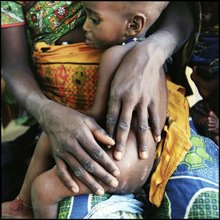PREAMBLE: One of the world’s most intractable public health problems is the high mortality of women due to pregnancy related causes. Over several decades (until recently), maternal mortality in developing countries appears to have been non-responsive to a range of interventions, perhaps because of inadequate intervention design or the inability to scale these to a level that can have impact on population health. In many countries, social and health policies that could facilitate the status of women, particularly in their right to make independent decisions with regard to their own health, have remained underdeveloped; it is of low priority in the world’s male-dominated political systems. Health services also have been inadequate to help lower maternal mortality: insufficient attention to prevention and inadequate access to treatment services of quality when critically needed.
Most donor countries recognize maternal health as a global public health priority. However, in Canada (under the regime of Conservative Prime Minister Stephen Harper), this global imperative is being sacrificed to partisan politics of the most ill-informed kind: it risks becoming a platform for the “religious right” to rail against the use of donor funds for abortion rather than to address in a holistic manner the most important needs of women that can assure improvement in their health.
Only last year, the administration of US President Barack Obama rescinded the global “gag order” of the preceding Bush regime, that required recipients of US aid – even in the realm of reproductive health – to deny access to safe abortion services if accepting US funds. This enlightened policy shift brings the US international development policy in line with that of the global community generally. It is ironic therefore that Canada – once a leader in this respect – appears to be taking a giant step backwards. Given the removal of access to safe abortions from the frame of reference, it is extremely doubtful that a recent Request for Proposals to guide the policy of the Canadian government in this regard, could attract anyone with a rigorous track record in this area of international health development.
Taking Africa as an example, as the recent "African Century" series of articles in the Globe and Mail (ref: May 11, 2010 issue) makes clear, more than 90% of Africans live in countries where abortion is restricted. It is legally prohibited in 14, while in others it is only permitted only to preserve the life or physical health of the woman. As a result, virtually all of the estimated 5.6 million abortions performed annually in Africa are unsafe, carrying with an unconscionable risk of complications and death.
Simply put, along with access to contraception, antenatal care, safe deliveries, reliable transportation to advanced care when this is urgently required (otherwise known as emergency obstetric care, which includes surgical intervention if needed as well as prompt treatment of post-partum infection and hemorrhage), access to safe abortion is part of any coherent plan to improve reproductive health and reduce maternal mortality. Knowing all this, and both the health and international development arms of the Canadian government surely should know this, to specifically and deliberately exclude funding of safe abortions in an aid package aimed at reducing maternal mortality would render the donor complicit in those deaths.
We labeled this issue “Maternal Mortality – an Integrity Test for Politicians” after realizing that many politicians are intellectually challenged by the technical nature of what is scientifically sound evidence regarding the nature of the problem at hand, and what works or doesn’t in addressing it. It is also an ethical test… in essence whether they (the ruling political party) are in it for cheap political gains among their home base, or whether higher reasoning will prevail in the interests of the health of millions of women around the world. Just how the G8 countries deal with this in their upcoming meetings will be a direct reflection of their collective political integrity. Based on public utterances to date, it seems like all the G8 countries except Canada may pass this test.
For the lead item of this month’s blog, we therefore attach below the polite but authoritative view of the Lancet on Canada’s G8 Leadership. This we follow by the first good news in many decades, that maternal mortality globally is finally being reduced.
CANADA'S G8 HEALTH LEADERSHIP
The Lancet May 8th, 2010
As a World Report in The Lancet today shows, Canada's pledge, as host of this year's G8 Summit, to make maternal and child health one of its key issues is moving forward. At a meeting in Halifax, Nova Scotia (April 27—28), the G8 development ministers agreed to back Canada's provisional set of principles to improve the health of women and children in developing nations.
Canada should be praised for making maternal and child health a priority issue for the G8. As an Article by Margaret Hogan and colleagues in today's issue shows, around 350 000 women die during childbirth every year. 9 million children younger than 5 years also die every year. Most of these deaths are preventable. Canada's health plan to address this situation is still thin on details but it promises to include training and support for frontline health workers; better nutrition and provision of micronutrients; treatment and prevention of diseases such as pneumonia, diarrhoea, malaria, and sepsis; screening and treatment for sexually transmitted diseases, including HIV/AIDS; family planning; immunisation; and clean water and sanitation.
However, a few key elements are missing from the framework. For example, there is no talk of emergency obstetric care. This omission is likely to be an oversight and should be rectified. Improving access to safe abortion services is also absent from the plan. Sadly, this omission is no accident, but a conscious decision by Canada's Conservative Government not to support groups that undertake abortions in developing countries.
This stance must change. 70 000 women die from unsafe abortions worldwide every year. The Canadian Government does not deprive women living in Canada from access to safe abortions; it is therefore hypocritical and unjust that it tries to do so abroad. Although the country's decision only affects a small number of developing countries where abortion is legal, bans on the procedure, which are detrimental to public health, should be challenged by the G8, not tacitly supported. Canada and the other G8 nations could show real leadership with a final maternal health plan that is based on sound scientific evidence and not prejudice.
Source: The Lancet, Volume 375, Issue 9726, Page 1580, 8 May 2010
SUMMARY: Maternal mortality for 181 countries, 1980—2008: a systematic analysis of progress towards Millennium Development Goal 5
(Note: Details of source and authorship given below)
Background: Maternal mortality remains a major challenge to health systems worldwide. Reliable information about the rates and trends in maternal mortality is essential for resource mobilisation, and for planning and assessment of progress towards Millennium Development Goal 5 (MDG 5), the target for which is a 75% reduction in the maternal mortality ratio (MMR) from 1990 to 2015. We assessed levels and trends in maternal mortality for 181 countries.
Methods: We constructed a database of 2651 observations of maternal mortality for 181 countries for 1980—2008, from vital registration data, censuses, surveys, and verbal autopsy studies. We used robust analytical methods to generate estimates of maternal deaths and the MMR for each year between 1980 and 2008. We explored the sensitivity of our data to model specification and show the out-of-sample predictive validity of our methods.
Findings: We estimated that there were 342 900 (uncertainty interval 302 100—394 300) maternal deaths worldwide in 2008, down from 526 300 (446 400—629 600) in 1980. The global MMR decreased from 422 (358—505) in 1980 to 320 (272—388) in 1990, and was 251 (221—289) per 100 000 livebirths in 2008. The yearly rate of decline of the global MMR since 1990 was 1•3% (1•0—1•5). During 1990—2008, rates of yearly decline in the MMR varied between countries, from 8•8% (8•7—14•1) in the Maldives to an increase of 5•5% (5•2—5•6) in Zimbabwe. More than 50% of all maternal deaths were in only six countries in 2008 (India, Nigeria, Pakistan, Afghanistan, Ethiopia, and the Democratic Republic of the Congo). In the absence of HIV, there would have been 281 500 (243 900—327 900) maternal deaths worldwide in 2008.
Interpretation: Substantial, albeit varied, progress has been made towards MDG 5. Although only 23 countries are on track to achieve a 75% decrease in MMR by 2015, countries such as Egypt, China, Ecuador, and Bolivia have been achieving accelerated progress.
Funding: Bill & Melinda Gates Foundation
Source: Hogan MC, Foreman KJ, Naghavi M, Ahn SY, Wang M, Makela SM, Lopez AD, Lozano R, Murray CJL. Maternal mortality for 181 countries, 1980—2008: a systematic analysis of progress towards Millennium Development Goal 5. The Lancet, 375, 9726, 1609 - 1623, 8 May 2010.
FROM a Great Canadian and World Statesman
"A great gulf... has... opened between man's material advance and his social and moral progress, a gulf in which he may one day be lost if it is not closed or narrowed..."
Lester B Pearson
http://nobelprize.org/nobel_prizes/peace/laureates/1957/pearson-lecture.html
INSPIRATIONAL WELCOME ............................... from T.S.Eliot's "Little Gidding"
If you came this way From the place you would come from... It would be the same at the end of the journey...
If you came, not knowing what you came for, It would be the same... And what you thought you came for Is only a shell, a husk of meaning... From which the purpose breaks only when it is fulfilled If at all.


























